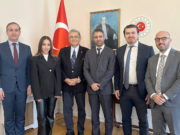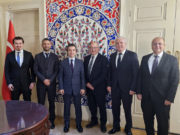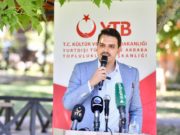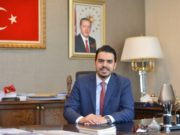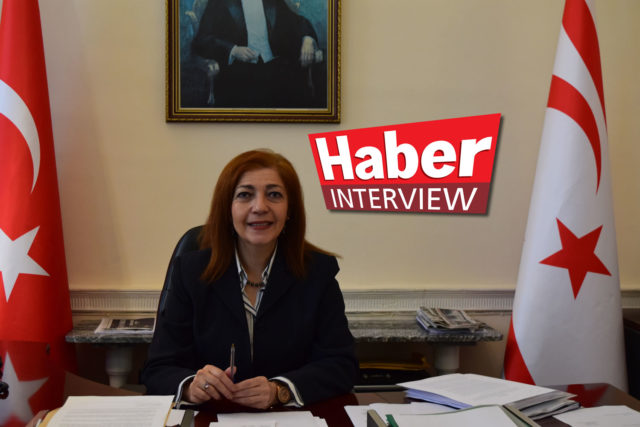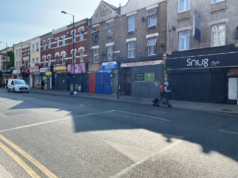Zehra Başaran, the most senior Turkish Cypriot in London, talks to Haber about the Cyprus peace deal, voting and military service
There are plenty of rumours milling around the community about the Cyprus peace talks but Turkish Cypriot people in the UK would do well to ignore the rumours and wait for an official announcement.
That was the word from Zehra Başaran, the most senior Turkish Cypriot official based in the UK, who spoke to Haber newspaper in her offices last week.
Taking her post at the Turkish Republic of Northern Cyprus representative’s office in London last year, she holds the rank of ambassador at the Foreign Ministry.
After spending her childhood in Küçük Kaymaklı, in the centre of the island, she fled north with her family during the violence on 1964 and never returned. Turkey’s 1974 military intervention – triggered by a coup attempted backed by Greece – brought security and a region we would trust, she said.
Ms Başaran spent a short time reading the English news on the Turkish Cypriot broadcaster Bayrak – she read out the Turkish Republic of Northern Cyprus’s 1983 declaration of independence, she said – before starting a career in the Foreign Ministry.
Peace talks today
Today’s Cyprus peace talks are a constant cause of anguish, particularly among older Turkish Cypriots in the community, who talk endlessly in North London’s coffee houses about how they fear their ancestors’ property will be handed over in a land exchange or political rights sacrificed.
“Everyone is unhappy by the rumours milling around,” Ms Başaran told this newspaper.
“But as far as we can tell from the official announcements, nothing is certain yet.”

She said Turkish Cypriot people should feel reassured that if an agreement is reached, the details of the deal will be announced and it will be put to a referendum – just like the Annan plan was in 2004.
“Until everything is agreed, nothing is agreed,” she added.
Teaching youngsters Turkish
On education, Ms Başaran said the Turkish Cypriot government had for decades sent teachers to the UK to help the expatriate community’s children learn their parents’ language and culture.
“The Turkish Republic of Northern Cyprus sent nine teachers this year and there’s a pleasant competition between the schools in London,” she said.
But she said interest was falling among teenagers and that numbers had dropped dramatically compared to a decade ago.
While there were around 300 14 and 15-year-olds attending Turkish schools in the UK during the 1980s, this figure has reduced around 30 today.
But she said the feelings of Turkish Cypriot identity were strong and many teenagers were embarrassed that they couldn’t speak the language well.
One of her ideas is to create a club – outside of formal language classes – where they can come together, socialise and speak Turkish together.
“We now access to every Turkish newspaper and television show at the click of a button. There are very few reasons left not to learn Turkish,” she added.
Voting overseas
Many thousands of citizens of the Turkish Republic of Northern Cyprus – an entity recognised by Turkey, but not the United Kingdom – are thought be living in Britain, but none have the right to vote in Turkish Cypriot presidential and parliamentary elections.
Ms Başaran said there were no plans in this direction at the moment, but she added that if there ever was a member of Turkish Cypriot assembly to be elected to represent expatriates in the UK, there would need to be an overseas electoral roll.
“This is why I urge Turkish Cypriots in the UK to register with us, to enrol as overseas citizens in case the need arises in the future,” she said.
After Britain leaves the European Union, Turkish Cypriot citizenship with a Cyprus peace deal will be the way to secure full EU citizen rights, she added.
Get your identity card
This year marks the 100th anniversary of Turkish Cypriot migration to the UK, Zehra Başaran said, following a decree that permitted people from the then-colony of Cyprus to travel to Britain.
The precise number of Turkish Cypriots who live in Britain today is unknown. According to the most recent census in 2011 there are around 35,000 of them resident in London and beyond, but Ms Başaran believes this is the “tip of the iceberg”.
She said anyone with Turkish Cypriot heritage is regarded as a “natural citizen” of the Turkish Republic of Northern Cyprus and urged those within the third and fourth generation of migration to register with them.
Anyone born in the UK who has a Turkish Cypriot mother, father, nene (grandmother) or dede (grandfather) is covered by the scheme and can register by coming to the TRNC offices in Bedford Square, central London.
“Turkish Cypriots need our help when a member of their family passes away, or when a property issue arises,” she said.
“Both TRNC and British citizens have access to our consular services, but it’s more expensive for British citizens.”
To register as a citizen, people with Turkish Cypriot heritage simply need to bring their birth certificate to the consulate offices and fill out a one-page form. There is a £3 processing fee.
“Don’t worry about military service”
Zehra Başaran said military service was a major cause for weariness among expatriate Turkish Cypriots, particularly those who are not citizens but want to visit the land of their heritage.
All Turkish Cypriot men aged 18-49 are eligible for service, even if they are based overseas, but they can pay to reduce their obligations and can therefore visit North Cyprus for up to 120 days in a year.
“Some Turkish Cypriots are losing their connection to the motherland over fear of military service,” Ms Başaran said.
But she said the system had changed in recent years and the military authorities had made their procedures easier.
Turkish Cypriot men once faced arrest at the border when they landed in the country, but now they are advised simply to put their paperwork during their stay in the TRNC by visiting a military service office.
The same paperwork can be completed by visiting the Turkish Cypriot representative’s office in London, Ms Başaran said.


